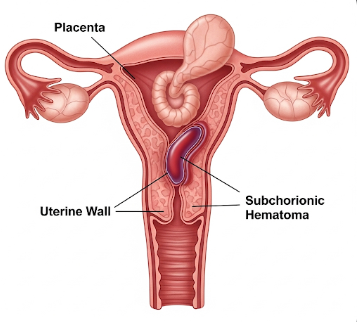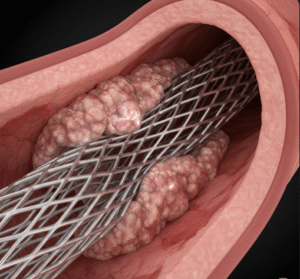➤ Overview
Subchorionic hematoma (SCH) is a condition in pregnancy where blood collects between the chorion (outer fetal membrane) and the uterine wall, creating a localized hematoma. This is one of the most common causes of first-trimester vaginal bleeding, and while many cases resolve spontaneously, it can sometimes increase the risk of miscarriage or pregnancy complications.
In South Korea, SCH is assessed by obstetricians and maternal-fetal medicine specialists using ultrasound imaging. Early diagnosis and careful monitoring are crucial to ensure maternal and fetal well-being, guide treatment, and provide reassurance to expectant mothers.
➤ Key Facts
→ Subchorionic hematoma occurs in up to 20% of pregnancies in the first trimester.
→ Size and location of the hematoma influence the risk of pregnancy complications.
→ In Korea, high-resolution ultrasonography allows precise detection and monitoring.
→ Many women with SCH carry pregnancies to term without complications.
→ Larger hematomas may increase the risk of miscarriage, preterm labor, or placental abruption.
→ Management focuses on observation, symptom control, and lifestyle modifications.
→ SCH is more common in women with assisted reproductive technology pregnancies, advanced maternal age, or previous miscarriage.
➤ What is Subchorionic Hematoma?
Subchorionic hematoma is defined as the accumulation of blood between the chorionic membrane and the endometrium, caused by partial detachment of the chorion from the uterine wall.
→ Small hematomas – Often asymptomatic, detected incidentally on routine ultrasound.
→ Large hematomas – Can cause vaginal bleeding and cramping.
→ Dynamic nature – Hematomas may grow, shrink, or resolve during the pregnancy.
→ Indicator of early placental issues – Can signal areas of weak attachment or vascular fragility.
Korean obstetricians emphasize ultrasound monitoring, assessment of hematoma size, and evaluating the risk for miscarriage or preterm labor.
➤ What Symptoms are Related to Subchorionic Hematoma?
While SCH can be asymptomatic, it may present with the following clinical features:
→ Vaginal bleeding or spotting – Ranging from light to heavy.
→ Lower abdominal or pelvic pain – Cramping similar to menstrual discomfort.
→ Back pain – Mild or moderate, sometimes radiating to the lower back.
→ Clot passage – Occasionally, small blood clots may be expelled.
→ Asymptomatic cases – Detected only during routine ultrasound.
→ Nausea or fatigue – Often due to associated pregnancy changes rather than SCH itself.
→ Increased anxiety or concern – Emotional impact due to bleeding during early pregnancy.
➤ What Causes / Possible Causes?
Subchorionic hematoma occurs due to partial separation of the chorionic membrane from the uterine lining, leading to localized bleeding:
→ Implantation-related detachment – Improper attachment of the embryo to the uterine wall.
→ Trauma or mechanical factors – Minor falls or physical activity can sometimes trigger bleeding.
→ Assisted reproductive technology (ART) – Higher risk in IVF or ovulation induction pregnancies.
→ Previous miscarriage or uterine surgery – Weakening of the endometrium may predispose to SCH.
→ Vascular fragility – Fragile blood vessels in early pregnancy prone to rupture.
→ Hormonal factors – Low progesterone levels may affect placental attachment.
→ Multiple gestations – Twin or higher-order pregnancies may increase hematoma risk.
➤ When Should I See My Doctor?
Immediate consultation is recommended if SCH is suspected or diagnosed, particularly with the following warning signs:
→ Vaginal bleeding increasing in amount or duration.
→ Severe abdominal or pelvic pain.
→ Passage of clots or tissue.
→ Cramping accompanied by dizziness or fainting.
→ History of recurrent miscarriage or previous SCH.
→ Concern for multiple gestation or assisted pregnancy.
→ Any bleeding episodes during pregnancy, especially in the first trimester.
➤ Care and Treatment
Management of SCH focuses on observation, risk reduction, and symptomatic relief:
→ Ultrasound monitoring – Regular imaging to assess hematoma size and resolution.
→ Rest and activity modification – Limiting strenuous exercise or heavy lifting.
→ Hydration and nutrition support – Maintaining overall maternal health.
→ Progesterone supplementation – In some cases, to support early pregnancy.
→ Pain relief – Safe analgesics under obstetric guidance.
→ Avoidance of smoking, alcohol, and certain medications – Reduces risk of complications.
→ Emotional support and counseling – Managing anxiety associated with bleeding.
→ Follow-up care – Ensuring hematoma resolution and monitoring fetal growth.
➤ Treatment Options in Korea
South Korea offers advanced care for subchorionic hematoma, integrating obstetrics, maternal-fetal medicine, and patient support:
Diagnosis in Korea
→ High-resolution transvaginal and transabdominal ultrasound for hematoma detection.
→ Doppler studies to evaluate blood flow and placental health.
→ Laboratory testing for hormonal levels, coagulation, and early pregnancy markers.
Medical Treatments in Korea
→ Progesterone therapy for patients with recurrent miscarriage risk.
→ Symptomatic medications for pain and discomfort during early pregnancy.
→ Close monitoring of fetal development to prevent complications.
Advanced Therapies in Korea
→ Hospital admission for high-risk cases with large hematomas or persistent bleeding.
→ Multidisciplinary care for assisted reproductive technology pregnancies.
→ Counseling and support integrating Western medicine and Korean traditional maternal care practices.
Rehabilitation & Support in Korea
→ Education on bed rest, activity modification, and bleeding monitoring.
→ Regular follow-up ultrasounds to track hematoma size and resolution.
→ Psychological support to reduce anxiety and stress during early pregnancy.













